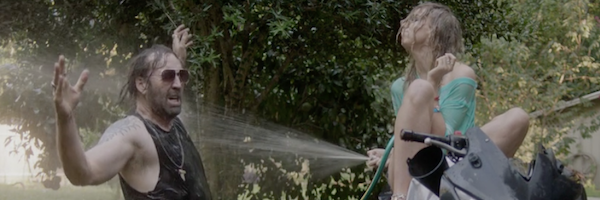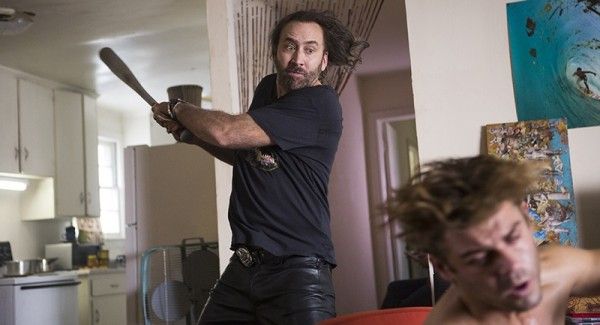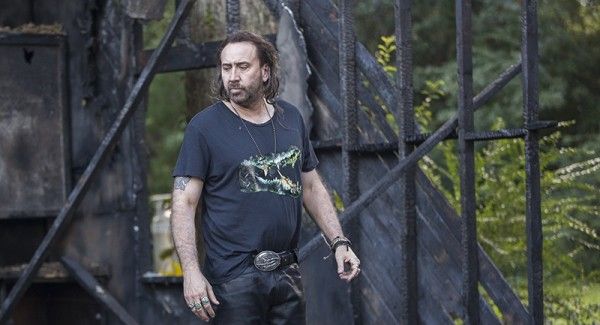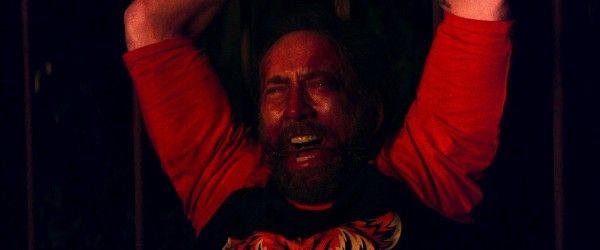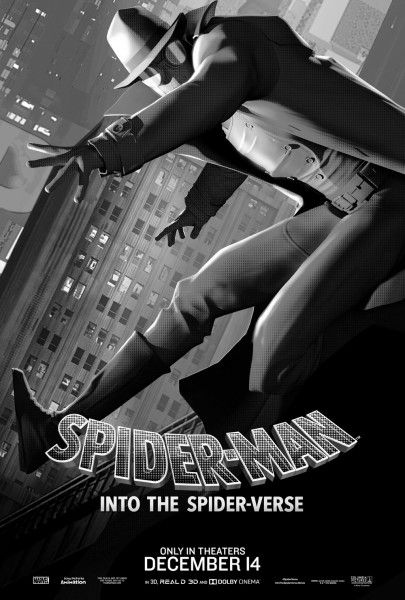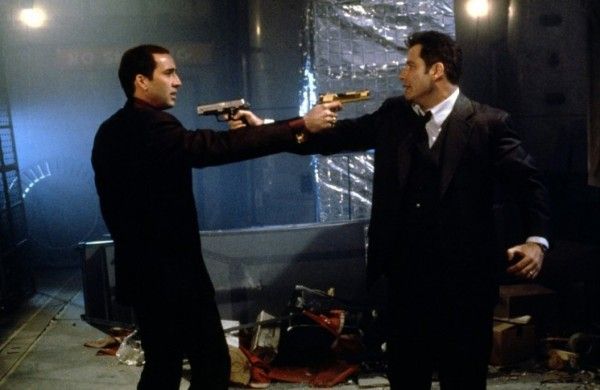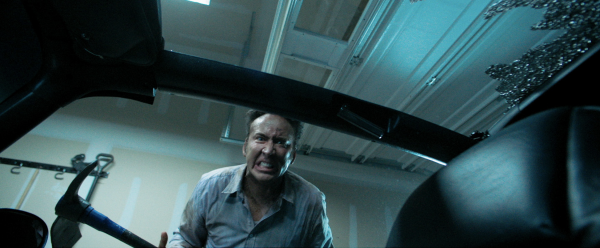Nicolas Cage has had a wild year, as if Nicolas Cage knows how to have any other kind of year but wild. Not only did he finally play Superman, but the actor's 2018 also kicked off with the hype for Panos Cosmatos' a heavy metal acid trip that sees Cage having a primal pantsless freakout, doing an ungodly amount of cocaine, and then getting into violent chainsaw fights with otherworldly demons to avenge the love of his life. I'd forgive you if you assumed Mandy is the most out-there thing Cage appeared in this year, but then I'd also assume you hadn't heard of Between Worlds. Written and directed by Maria Pulera, the film stars Cage as greasy-haired truck driver Joe, who finds himself in a supernatural battle of wits when the spirit of his dead ex-wife Mary (Lydia Hearst) possesses the daughter (Penelope Mitchell) of his new, psychically-gifted girlfriend, Julie (Franka Potente). Cage has roughly a dozen of the most over-the-top sex scenes you can imagine, one of which includes his character reading from a memoir...written by Nicolas Cage. Like I said, wild.
Before Between Worlds' December 21 premiere, Collider participated in a wide-ranging e-mail interview with Cage discussing the film, Spider-Man: Into the Spider-Verse—in which Cage provides the voice for Spider-Man Noir—Mandy, Face/Off, and a lot more.
Collider: Between Worlds includes a scene where you’re having sex while reading from a book titled “Memories” by Nicolas Cage. What can you tell me about filming that? Was the title of that book in the script, or is that something that was decided after you came aboard?
NICOLAS CAGE: Well I thought it was extremely funny and anytime you can break the fourth wall pushing the envelope in terms of traditional or narrative is an experiment worthy of trying. I had never done anything like that - to read a book by the actor who is playing the character. I was inspired by the novels of Henry Miller, Tropic of Cancer, Tropic of Capricorn—I always thought they were not only sensual but hilarious in terms of the braggadocio of Henry Miller—that he would go into great detail about his adventures in the sensual realm and I wanted to bring a little of that kind of humor to Between Worlds with that concept.
If “Memories” by Nicolas Cage was a real memoir, what’s the one anecdote you know for sure would be in it?
CAGE: It's no secret that I've been, and still am, a huge fan of Prince. I thought, like many of us, that he was a pure artist. I would and still do think about what he would do - like if I have a question about "should I do this or should I do that?" I often think about what his perception would be even though I didn't know him. But I was a fan and I would go to his concerts and the best concert I ever saw was in England. I wrote him a letter thanking him for the wonderful music - I found out that he liked Sherry and when I was in New York making a movie, I went to a store in New York and I bought a bottle of Sherry and I sent it to him with a note. Around the time that I had been on deck with Leaving Las Vegas and whatever happened in terms of the Oscars happened. I went to Elton's Hollywood Oscar party - at that time I was still with Patricia Arquette and I had the award with me, we walked in and there was Elton and he said "you know, Prince is here, isn't he a genius?" and I said "Yeah, he's a genius, he's one of my favorites of all time!", so I walked through the party and Stevie Wonder was there and I told him that I used to call Patricia my "Golden Girl" after the song and he took her hand and serenaded the song to her, so I put the award on the table in front of Prince and I remember asking him if he got my letter and he said yes and that he was very happy that I was there. I never ask anyone for a picture but I remember asking for one with Prince because of the monumental way that he motivated and inspired me. I asked him for a picture and he said "no, I just can't" and I was in shock but I understood and I still love him. I had read some of his interviews and I knew that he didn't like the idea of the photograph "taking his soul". He was very sensitive about technology but I still find it amazing that I got to meet one of my heroes when we had that exchange.
One of the most interesting things I’ve seen you say is that you occasionally choose roles as a vehicle for a certain style or type of acting you want to employ. (Peter Loew in Vampire’s Kiss was you doing Max Schreck, for example.) Is there any style or inspiration you had in mind for Joe and Between Worlds?
CAGE: In this particular case I would have to say not specifically but there are other movies that I have ventured out on because I was inspired by someone else's work or music or painting. With this movie my full inspiration would be working with the director. She is unlike anyone I've ever met before. She is truly a unique and a gifted personality who seemed to have a very clear vision of an almost raunchy yet heartfelt and comical approach to the way she wanted to use me and whatever my abilities were in the movie. So I would have to give her all the credit for whatever influences were channeled.
You have a great on-screen laugh and Between Worlds has a few genuinely joyous scenes, whether it’s you getting high with Franka Potente or having a water fight with Penelope Mitchell. What’s the key, for you, to expressing just pure, unabashed joy on-screen?
CAGE: Well I don't know that it's so much joy or what I find humorous. Most of the things I find funny are things that are unorthodox or taboo or shocking or just plain uncomfortable. I like watching people squirm - so those scenes that we have in the movie that were cringe and squirm inspiring is what made me laugh so I would approach it from that angle.
On the flip side of that, between Mandy and Between Worlds you’ve been portraying a lot of characters who are grieving dead spouses; Mandy actually includes one of my favorite grieving scenes of all time. What do you have to dig into to portray that emotion?
CAGE: I have to go towards what is in my own personal memory book when I can. In the case of Mandy I was still grappling with the loss of my father even though its been many years. And I had been constrained to a wheelchair for three months which gave me a depth of compassion for those who are in that situation for life and also going through a divorce after 14 years coalesced into that scene so I called all of those elements up and put it into the moment of grief that I was going through in the bathroom. I can't always do that, if you look at a movie like Joe, I had a scene where I got into a bar brawl and I didn't have the emotion at the time so what I do sometimes is I read current events and I come across a story that breaks my heart, it's easy to do if you look around and have empathy. A story I read that day and put into the movie was a story about a toddler who fell into a pit of African dogs at the zoo, it was an image that troubled me. There was a scene with a character who wanted to pick on this man-child and I just channeled that. It's a matter of opening yourself up to finding those emotions - whether it's a trip down memory lane or what's happening now in the Universe.
The chainsaw duel in Mandy is one of my favorite fight scenes of 2018. What’s one memory from filming that movie that will stick with you forever, be it that scene or any other?
CAGE: We were trying to get this one shot after Red already had the skull juice and turned into a golem of sorts...and he is about to grab one of the cult children and throw him against the tree and Panos had to have it happen just right. It was all about timing, the speed in which I would get him against the tree. We did that shot about 15 or 20 times - which we never had happen before, and after I looked at Panos and said "That was the shot from Hell." and he looked at me and took about a two-second beat and he said, "Well, they are all from Hell."
What specific things did you do in your vocal performance to channel noir icons like Humphrey Bogart and James Cagney for Spider-Man: Into the Spider-Verse?
CAGE: Nothing specific but more of a recall, more of a collage of memories, to try and bring some kind of flavor or color of it - but nothing 100%. It's still very fluid. It's more of an essence of the way those guys would talk in their movies back in the 30s.
Face/Off turned 30 last year, but I just watched it recently and it holds up as one of the most uniquely fascinating action movies. What do you think it is that endures not only about the movie, but the performance you put on in it?
CAGE: The premise was so absurd - so potentially laughable. This idea of two people swapping faces and through acting, try to become one another in a convincing manner. After having a chance to work with both "John's" - at the top of their games we got there in a way that took what could have been a mistake and turned it into a memorable and exciting adventure for film enthusiasts to watch forever. I'm very proud of that movie and I think it is one of the best movies I've ever made because of the challenge and if we had not hit that bullseye, we all would have probably stopped working because it was a big movie and there was a lot of money on the line. Fortunately, the three of us and everyone else in the movie managed to work together in a way that the alchemy was there so it was fun and exciting.
When you think back on the movies you’ve done and the roles you’ve played, what’s the one performance choice that most surprised you in the moment?
CAGE: I can't say that any performance choice surprised me in the moment because every choice I make is very thought out. Even when I make a decision not to think and to give myself three or four bars of just going wild, that is even something I've thought out. Although sometimes I've been disappointed in the way some of my colleagues didn't utilize some of the stuff that myself and some my fellow thespians would come up with.
You said last year that you “don’t even like the word acting anymore.” Do you still feel that way, and if so what’s a more accurate way to describe what you do and why?
CAGE: Well I can't always say that I am this and with the risk of seeming like an arrogant, sanctimonious snot, I would say being a shamanic performance artist is something I aspire to. All actors, whether they know or not, are trying to delve into their dreams, emotions, and memories, and fully immerse themselves, into their imaginations so they don't have to act. What you are seeing and feeling is happening in the moment, even though it's done through a filter so it's not dangerous and no one is at risk. It is someone going within to bring something back to share with the audience. On top of that, there is the craft of what is entertaining, which is also equally important. What is funny? What is entertaining to watch in the way you are moving or speaking? It should never be lying. I know Lawrence Olivier once said, "What is acting but lying and what is good lying but convincing lying?" but I don't agree with him. I don't want to do that. I want it to be emotional and tangible. Picasso once said "What is art but a lie that tells the truth" and to me, that is what a film performance ought to be. I am a student and learning so I am still trying to work it out.
You’ve mentioned that you eventually want to focus primarily on directing. What, for you, is the ideal type of story to get you back behind the camera?
CAGE: I think I will always make movies as a performer, presence and even as a movie star. But I don't want to limit myself to that. I am getting older and I realize I have more to achieve. We can talk about Jerry Lewis - he wrote a book called "The Total Filmmaker" where he always put forth that to really make movies you had to act, write, direct, and do it all to be the total filmmaker. So I think that's something that has been a challenge for me that I want to embrace. I want to diversify my portfolio and do a bit of everything.
What’s the best creative advice you’ve ever received?
CAGE: It was about 30 years ago, I was just starting to hit. I was good friends with Sean Penn's brother, Chris, and Charlie Sheen. I would go over to Charlie's house with Martin Sheen and Chris Penn and we would watch movies. Martin would come by and say hello and he told me the only thing that matters with filmmaking is if you like where you were and who you were working with. He had just come off of Apocalypse. At the time I was too young to understand but as I grew older and started making more movies his words always came back to me. Now they have become a mantra for me. It really has come down to the exact words he said. He gave me the best advice I've ever heard in my professional career.
At this point in your career, what’s something about a project that makes it an immediate “yes”, and what is something that makes it an immediate pass?
CAGE: An immediate "yes" would be am I going to like the people that I'm going to be working with and am I going to like where I'm going. An immediate "no" would be I can tell I'm not going to like the people I'm going to be working with and I'm not going to like where I'm going.
In what ways has the public perception of who “Nicolas Cage” is changed you as an actor? As a person?
CAGE: I can state that in no way has the public opinion of me changed me as a person.

